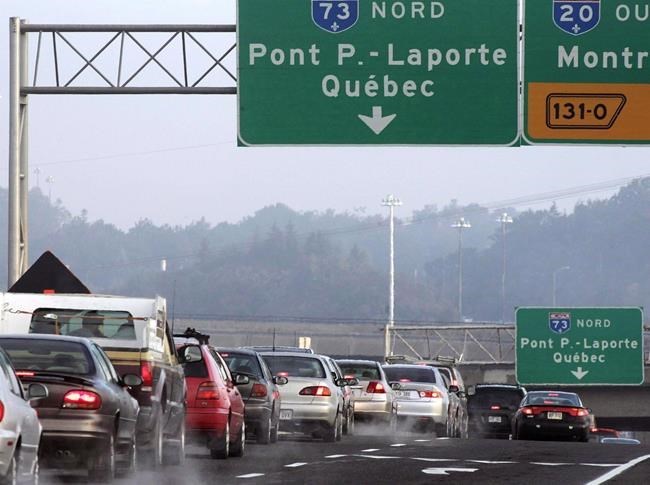MONTREAL — Coalition Avenir Québec Leader François Legault may have been campaigning in a Montreal suburb on Monday, but he couldn't escape a barrage of questions from reporters on a proposed tunnel for Quebec City.
The project linking the provincial capital with its south shore is one of the major unfulfilled promises the CAQ made in the 2018 election — and the party's main adversary in the Quebec City region during this election campaign won't let Legault forget it.
"People in Quebec City have been talking about it for decades, we want that bridge and (Legault) promised us that bridge four years ago and he flip-flopped," Conservative Leader Éric Duhaime told reporters Monday.
In a bid to woo Quebec City voters in 2018, Legault promised he would build a "third link" across the St. Lawrence River — to complement the Pierre Laporte Bridge and the Quebec Bridge — and have the “first shovel in the ground” before the end of the CAQ's first mandate in 2022. At the time, the CAQ said the third link could be a bridge or a tunnel.
Construction has not started on a third link, and Legault recently admitted there are no completed feasibility studies on his new proposal to build a tunnel connecting the two shores.
Duhaime has spent a large part of the current campaign reminding voters about the CAQ's failure and accusing Legault of covering up studies ordered by the previous government on a third link.
"It's the most important project ever in the Quebec City region," Duhaime told reporters. "It's important that the population, before they vote, that they have all the information on hand. Currently, there's no transparency."
Duhaime said he filed an access to information request with the Transport Department to obtain reports and advice the government has received on the proposed crossing.
Legault is refusing to release the studies — he says they were ordered under the Liberals and don't apply to the new tunnel project he is proposing. His four-lane tunnel would cost $6.5 billion and link downtown Quebec with central Lévis, Que.
Duhaime said the tunnel is a waste of money and is instead calling for a bridge connecting the eastern part of the two cities. The Conservative leader says a bridge would be cheaper and easier to build than a tunnel and would cost between $3 billion and $5 billion, with less risk of cost overruns.
But Legault says a bridge would defile the bucolic landscape of the eastern part of the region, which is home to the sparsely populated Île d'Orléans. A bridge, the incumbent premier told reporters in Longueuil, Que., is "feasible, but it's not what we want."
It's in the Quebec City area where the Conservative party — which has never had one of its members elected to the Quebec legislature — hopes to break through this election.
A Leger poll published last week put Duhaime's party at 25 per cent in the Quebec City area, behind the CAQ at 44 per cent. In the Chaudière-Appalaches region, south of the capital — which includes Lévis — the Conservatives are at 29 per cent, while the CAQ is at 48 per cent.
The two regions are the only parts of the province where the Conservatives are polling above 20 per cent. In the three ridings where the Tories are neck and neck with the CAQ, according to poll aggregating site QC125.com, two are located in Chaudière-Appalaches — in an area known as Beauce — while one is located immediately north of Quebec City.
Meanwhile, Quebec Liberal Leader Dominique Anglade on Monday faced questions about her political future. Anglade said she plans to stay on as Liberal leader after the Oct. 3 election — but she maintained that's because her party will win.
"My intention is to remain in office and to be premier of Quebec," she told reporters in Montreal.
Recent polls have put the Liberals more than 20 percentage points behind the governing Coalition Avenir Québec party, and the numbers indicate that Anglade's own Montreal riding — St-Henri—Ste-Anne — is a three-way race.
Anglade was in Montreal to announce her party's promises for seniors, which include payments of up to $2,000 a year to help people over 70 receive health care at home and avoid having to move to a seniors home.
Québec solidaire spokesman Gabriel Nadeau-Dubois was in Quebec City, where he said his party would ban large companies from throwing out unsold food. Québec solidaire's plan is to reduce "food waste" by 50 per cent.
Parti Québécois Leader Paul St-Pierre Plamondon was in Sept-Îles, Que., 640 kilometres northeast of Quebec City, where he promised to impose a 25 per cent tax on the "excess profits" of oil companies.
This report by The Canadian Press was first published Sept. 19, 2022.
— With files from Frédéric Lacroix-Couture and Stéphane Rolland.
Jacob Serebrin, The Canadian Press



